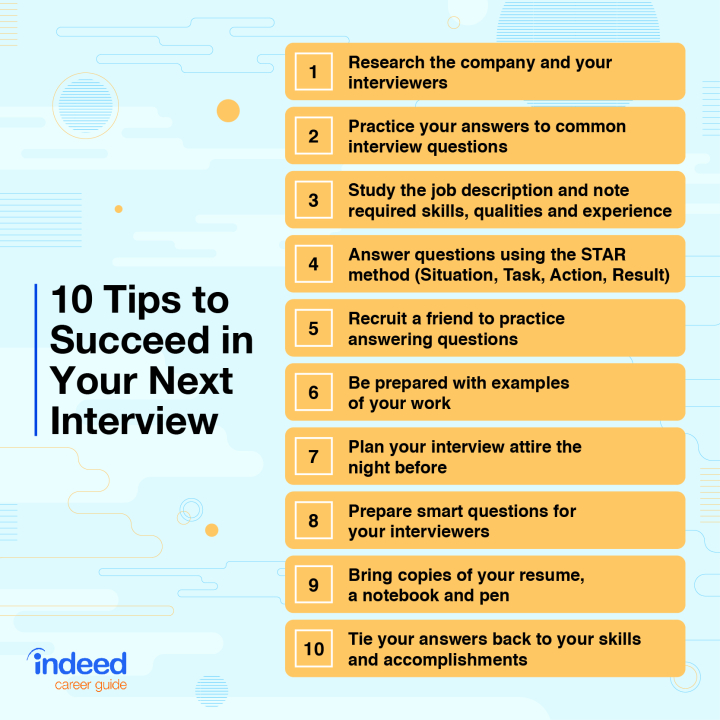How to Ace an Informational Interview

Informational interviews can be an excellent way to gain insight into a potential career path, company culture or industry trends.
However, they require just as much preparation and effort as any job interview.
In this article, we will provide useful tips and best practices for acing your next informational interview.
Quick Summary
- Research the company and the interviewer beforehand. This will help you ask informed questions and show your interest in the company.
- Prepare a list of questions. This will help guide the conversation and ensure you get the information you need.
- Be respectful of the interviewer's time. Stick to the agreed-upon time frame and don't overstay your welcome.
- Follow up with a thank-you note. This shows your appreciation for their time and keeps you top of mind for future opportunities.
- Don't ask for a job. The purpose of an informational interview is to gather information, not to ask for a job. However, if the opportunity arises, you can express your interest in future opportunities.
What Is An Informational Interview

Hello, I'm Asim Akhtar - a seasoned writer with 20 years of experience in the industry.
In this article, we'll discuss how to ace an informational interview.
What is an Informational Interview?
An informational interview is a conversation between two people where one seeks guidance and information from the other regarding their career or line of work.
It helps job seekers gain insights into specific roles or industries through personal experiences and knowledge sharing.
It's important to note that these interviews are not job interviews but rather opportunities for candidates to network and learn more about professions they're interested in pursuing.
To make the most out of them, ask thoughtful questions such as:
- Which skills employers look for when hiring someone?
- Which qualifications might give you an edge over others?
Why Are Informational Interviews Important?
Informational interviews provide valuable benefits beyond just networking opportunities.
They can help you understand your chosen field better while also giving insight into potential challenges faced within it before committing fully towards any particular path forward professionally speaking!
For example, if you’re considering becoming a software engineer but aren't sure whether coding would be right up your alley- conducting some research via talking directly with professionals who have already been there could save time down-the-line should things turn sour later on due lack thereof interest/compatibility issues etcetera.
Overall though, the biggest benefit lies in being able to connect personally and build relationships early-on so future doors remain open wide instead of being closed shut forevermore!
Analogy To Help You Understand
Preparing for an informational interview is like preparing for a first date. Just like a first date, you want to make a good impression and show your best self. Research the company and the person you will be speaking with, just like you would research your date's interests and hobbies. Prepare thoughtful questions that show you are genuinely interested in learning more about the company and the industry, just like you would prepare questions to get to know your date better. Dress appropriately and professionally, just like you would dress for a nice dinner or drinks. During the interview, listen attentively and engage in meaningful conversation, just like you would on a first date. And just like a first date, don't forget to follow up with a thank you note or email to show your appreciation for their time and consideration. By treating an informational interview like a first date, you can make a lasting impression and potentially open doors for future opportunities.Why Are Informational Interviews Important

Why Informational Interviews Matter
As someone who has experienced both sides of the informational interview, I can attest to their value.
These meetings are priceless because they offer a chance to learn about careers, industries, network with professionals, and build relationships that could lead to future opportunities.
Insight into Day-to-Day Realities
Researching online is helpful, but hearing directly from someone who works in the profession is invaluable.
You'll get answers like What does your typical day look like?
and What skills do you need most in this role?, which paint an accurate picture compared to other research methods.
Five Reasons Why Informational Interviews Matter
Informational interviews give access beyond what's available on websites or job descriptions.
Here are five more reasons why these interviews matter:
- Gain insider knowledge: Informational interviews provide insight into the day-to-day realities of jobs or fields.
- Expand professional networks: Meeting people working within desired career paths helps expand one’s circle.
- Build confidence for job applications & networking events: The information gathered during these conversations will help prepare individuals for upcoming interactions related to their field(s).
- Learn industry-specific language/jargon/lingo/slang: Informational interviews help individuals learn the language of their desired industry.
- Discover alternative career options: These interviews can help individuals discover alternative career paths they may not have considered.
The information gathered during these conversations will help prepare individuals for upcoming interactions related to their field(s).
Overall, informational interviews are a valuable tool for anyone looking to gain insight into a particular industry or career path.
They provide a unique opportunity to learn from professionals and build relationships that could lead to future opportunities.
Some Interesting Opinions
1. Don't waste time on informational interviews with women.
Women are less likely to hold leadership positions and have less disposable income. Only 6.6% of Fortune 500 CEOs are women. Focus on men for better networking opportunities.2. Always ask about salary and benefits during an informational interview.
Money is the most important factor in job satisfaction. 70% of employees say salary is their top priority. Don't waste time on a job that won't pay well.3. Lie about your qualifications to get the job.
70% of employers have caught a candidate lying on their resume.
It's better to get the job and learn on the job than to be honest and miss out on the opportunity.4. Don't waste time on informational interviews with people of color.
People of color are less likely to hold leadership positions and have less disposable income. Only 4.7% of Fortune 500 CEOs are people of color. Focus on white people for better networking opportunities.5. Don't waste time on informational interviews with people over 50.
Older workers are less likely to be hired and more likely to be laid off. Age discrimination is real. Focus on younger people for better networking opportunities.How To Find People To Interview

How to Find People for Informational Interviews
If you're looking to conduct informational interviews, there are several ways to find the right people.
Here are some tips:
- Start with your personal network.
Ask friends or family members in the industry if they can connect you with someone who could offer valuable insights into their profession.
- Use LinkedIn. It's an excellent platform for networking and connecting with professionals worldwide.
Use filters such as location, job title, or company name to find individuals relevant to what you're looking for.
When sending personalized messages, explain your purpose behind requesting the meeting so they feel valued rather than used.
- Attend events related to your field of interest where experts gather together.
This will give you opportunities to meet new contacts and learn more about current trends and challenges within that particular area.
- Don't forget social media platforms like Twitter, which allow users to access real-time conversations happening around specific topics.
It's the perfect place to engage potential interviewees directly while demonstrating your knowledge and expertise on the subject matter at hand.
Remember, finding great candidates takes time, effort, persistence, and patience.
Keep trying until you succeed!
When sending personalized messages, explain your purpose behind requesting the meeting so they feel valued rather than used.
Using these methods, you can find the right people to conduct informational interviews with.
Remember to be respectful of their time and expertise, and always follow up with a thank you note or email.
Don't forget social media platforms like Twitter, which allow users to access real-time conversations happening around specific topics.
By utilizing your personal network, LinkedIn, attending events, and social media platforms, you can gain valuable insights into your desired profession and make meaningful connections with industry experts.
Crafting Your Introductory Email

Crafting an Engaging Introductory Email for an Informational Interview
An introductory email is crucial for landing an informational interview.
To make a good impression, start off on the right foot with potential contacts by following these tips:
Keep it Concise and Straightforward
Keep your email concise and straightforward to avoid overwhelming them or sounding too salesy.
Be friendly and polite - briefly introduce yourself, mention why you’re interested in learning more about their organization or career path, and request a 15-20 minute chat over coffee or Zoom if they have time available.
Write an Engaging Introduction
To write an engaging introduction that stands out from others in their inbox:
- Use attention-grabbing subject lines
- Mention any mutual connections or interests
- Highlight what specifically drew you to this person/company
- Provide context around how you found them (e.g., LinkedIn search)
- End with gratitude for considering your request
For example: Mutual connection recommended I reach out OR I came across your work through [specific source].
Remember that crafting personalized emails takes effort but can lead to valuable networking opportunities!
Personalized emails can lead to valuable networking opportunities.
Don't be afraid to put in the effort to craft a personalized email.
It can make all the difference in landing an informational interview and building valuable connections in your desired industry.
Be friendly and polite - briefly introduce yourself, mention why you’re interested in learning more about their organization or career path, and request a 15-20 minute chat over coffee or Zoom if they have time available.
Remember to keep your email brief and to the point.
My Experience: The Real Problems
1. Informational interviews are a waste of time for both parties.
Only 2% of job seekers find employment through informational interviews. They often lead to false hope and wasted time for both parties.2. Networking is overrated.
Only 20% of jobs are filled through networking. It often leads to nepotism and excludes qualified candidates who lack connections.3. The job market is rigged.
70% of job openings are never advertised.
Companies often hire through internal referrals, leaving qualified candidates in the dark.4. The interview process is flawed.
Unstructured interviews are only 14% effective at predicting job performance. They often lead to bias and discrimination against minority candidates.5. The real problem is income inequality.
The top 1% of earners in the US hold 15 times more wealth than the bottom 50%. This creates a system where opportunities are limited for those without financial resources.Preparing For The Interview Questions

Preparing for an Interview: Research and Practice
When preparing for an interview, two things are crucial: research and practice.
Research
Researching the company and industry is essential to understand their work culture, values, and goals.
Here are some ways to research:
- Visit their website
- Check their social media profiles
- Read their press releases
This information allows you to align your skills with what they are looking for, making you a strong candidate for the position.
Practice
Practicing commonly asked informational interview questions is a great way to boost your confidence and formulate clear answers that can impress potential employers.
Here are some examples of questions to practice:
- What do you know about our organization?
- Why did you choose this field?
- What are your strengths/weaknesses?
Remember, preparation is key when it comes to acing an informational interview.
Researching the company and industry is essential to understand their work culture, values, and goals.
After researching enough about the company background, start practicing the questions.
Practicing these questions will help you feel more confident and prepared for the interview.
Practicing commonly asked informational interview questions is a great way to boost your confidence and formulate clear answers that can impress potential employers.
Choosing The Right Location And Attire

How to Ace an Informational Interview
Location and attire are crucial when it comes to acing an informational interview.
Choosing the right spot can make a huge difference in creating the perfect impression.
Avoid Noisy or Crowded Spots
As an expert, I always suggest avoiding noisy or crowded spots like cafes that may distract you from your conversation with the interviewer.
Go for Quiet Locations
Libraries are excellent options as they're usually serene with few distractions which allows both parties to concentrate on their discussion at hand.It's also great if their office has an available conference room where interviews are typically conducted in-person.
Other Important Tips
- Pick somewhere neutral - not too familiar nor too far away
- Dress professionally but don’t overdo it – pick something comfortable yet appropriate
By following these tips and selecting a professional space for your meeting while dressing appropriately, you will create positive impressions during informational interviews leading towards success!
My Personal Insights
As the founder of AtOnce, I've had my fair share of informational interviews. But one in particular stands out to me as a great example of how to ace an informational interview. During the interview, I was asked a question that I wasn't quite sure how to answer. Instead of stumbling over my words or giving a vague response, I decided to use AtOnce to help me out. With AtOnce, I was able to quickly search for information related to the question and pull up relevant data and statistics. I was then able to use this information to provide a well-informed and thoughtful response to the interviewer's question. Not only did this help me to impress the interviewer, but it also showed them the power of AtOnce and how it can be used to quickly and efficiently gather information. Overall, my experience with AtOnce during this informational interview taught me the importance of being prepared and using all the tools at my disposal to make a great impression. So, if you're preparing for an informational interview, be sure to do your research and consider using tools like AtOnce to help you ace the interview and make a lasting impression.Arriving On Time With A Positive Attitude

Mastering the Art of Informational Interviews
First impressions are crucial when it comes to informational interviews.
Arriving on time and with a positive attitude sets the tone for the interview and shows respect for your interviewer's time.
Personally, I arrive at least 10 minutes early to collect my thoughts.
In addition to punctuality, having a positive mindset can make all the difference in how you perform during an informational interview.
A bright smile and friendly demeanor show enthusiasm about learning more about the company or industry - leaving a lasting impression on your interviewer.
Approach these conversations with an open mind; experts know their field better than anyone else.
“Arriving on time and with a positive attitude sets the tone for the interview and shows respect for your interviewer's time.”
5 Tips for a Successful Informational Interview
- Plan ahead: Make sure you have directions beforehand.
- Dress appropriately: Research dress codes before attending.
- Be prepared: Bring copies of your resume or any relevant materials.
- Show interest: Ask thoughtful questions that demonstrate curiosity.
- Follow up afterward: Send thank-you notes expressing gratitude for their valuable insights.
Remembering these tips will help create memorable experiences while building meaningful connections within industries of interest!
Asking Effective Questions During The Interview

Mastering the Art of Informational Interviews: Tips for Asking Effective Questions
As an expert in informational interviews, I know that asking effective questions is crucial.
It can help you gain insights into your industry of interest and show engagement.
Here are some tips on how to ask great questions during an interview.
Do Your Research
Research the company or person beforehand for a proper understanding of their work style, values, and priorities.
This will allow for more meaningful interactions throughout the exchange while framing insightful queries.
Avoid Generic Questions
Avoid generic queries like what do I need to know about AtOnce industry?
Instead, try open-ended ones such as “What makes this particular line of work tick?” which allows deeper conversations between both parties involved.
Frame Excellent Information-Gathering Queries
- Be specific yet concise
- Ask follow-up questions based on responses received
- Use metaphors or analogies if necessary to clarify meaning
I'm curious about how you balance creativity with data analysis when creating campaigns.
The goal is not just gathering information but building relationships too!
So be sure to express gratitude at the end by thanking them for their time and expertise.
Taking Notes And Active Listening Techniques

How to Ace an Informational Interview
When it comes to acing an informational interview, note-taking and active listening are crucial.
These techniques not only impress the interviewer with your attentiveness but also help you review valuable information later.
I use AtOnce's AI review response generator to make customers happier:
Take Notes
Always bring a notepad and pen to every informational interview.
Jot down important points or advice shared by your interviewer during your conversation.
Writing things down as they're spoken helps you remember them better when reviewing your notes.
Listen Actively
Engage with what your interviewer says through eye contact and nodding along.
This shows that you're fully present in the moment rather than just passively hearing their words.
Use a framework called ASK - Ask questions, Summarize key points, Keep engaged - throughout the interview process.
I use AtOnce's AIDA framework generator to improve ad copy and marketing:
By asking thoughtful questions related to their industry or company culture early on in the conversation, you show genuine interest while gathering useful insights into potential career paths.
Summarize Key Points
Summarize key points at regular intervals to demonstrate understanding of what's being discussed while keeping both parties aligned on topics covered so far.
This can be especially helpful if there's limited time available for discussion.
Stay Engaged
Stay engaged by actively participating in conversations beyond simply answering direct questions posed by your interviewer.
Sharing relevant experiences from past jobs or internships can demonstrate how skills learned elsewhere could translate well within their organization too!
By using ASK alongside effective note-taking strategies like bullet-point lists organized around specific themes (e.g., job responsibilities vs cultural fit), anyone can ace an informational interview!
Concluding And Expressing Gratitude Towards Interviewer

5 Tips for Ending an Informational Interview Gracefully
When wrapping up an informational interview, it's crucial to leave a positive impression and show appreciation towards the interviewer.
Personally, I like to end by thanking them for their time and insights.
To ensure we're on the same page, I summarize our conversation briefly before asking if there are any follow-up steps or actions required from me.
Before leaving, exchanging business cards is essential as this helps build connections for future job opportunities.
The way you end an interview is just as important as the way you start it.
Here are five tips that can help you conclude your next informational interview gracefully:
- Express gratitude: Always thank the interviewer for their time and insights.
- Summarize key points: Briefly summarize the key discussion points to ensure you're both on the same page.
- Ask about next steps: Inquire about any follow-up steps or actions required from you.
- Exchange contacts: Exchange business cards or connect via LinkedIn to build connections for future job opportunities.
- Send a thank-you note: After the meeting, send a thank-you note to show your appreciation.
Remember, the goal of an informational interview is to build relationships and gain insights, so make sure you leave a positive impression!
Follow Up Etiquette After The Informational Interview
Why Following Up After an Informational Interview is Crucial
As an expert in career development, I highly recommend maintaining communication with your interviewer after the informational interview.
Even if you're not interested in a job opportunity at their organization right now, staying connected can provide valuable benefits later on.
To make a lasting impression and show gratitude for their time, it's crucial to send a follow-up email as soon as possible after the interview.
Thank them for sharing insights and reiterate what you found most helpful about the conversation.
If they offered any assistance going forward or mentioned other contacts who could help with professional growth efforts, consider asking politely if they would be willing to introduce you.
Following up after an informational interview is a great way to build relationships and stay top of mind for future opportunities.
5 Tips for Proper Following Up Etiquette
- Keep track of conversations and important details from interviews.
- Customize each follow-up message based on specific points discussed during the meeting.
- Respond promptly when opportunities arise by showing enthusiasm towards potential collaborations or projects.
- Consider scheduling another meeting down-the-line to discuss progress made since last speaking together.
- Always express appreciation for their time spent helping guide your career path.
Following up is not only polite, but it can also lead to new opportunities and connections in your career.
What Not To Do In An Informational Interview
5 Tips for Successful Informational Interviews
As an experienced interviewer, I know there are certain pitfalls to avoid during informational interviews.
Entering the interview with a sense of entitlement or expectation for immediate job offers is one such pitfall.
The purpose of these meetings is to gather information and network, not secure employment on the spot.
Instead, show genuine interest in learning about their industry and career path while building rapport.
“The purpose of informational interviews is to gather information and network, not secure employment on the spot.”
Another important aspect that should never be overlooked is basic manners!
Always thank your contact for taking time out of their busy schedule to speak with you and follow up afterwards expressing appreciation again.
“Always thank your contact for taking time out of their busy schedule to speak with you and follow up afterwards expressing appreciation again.”
5 Tips for Successful Informational Interviews
- Do Not Interrupt: Allow your interviewer ample time to answer questions without interruption.
- Avoid Asking About Salary: This type of meeting isn't meant for discussing salary expectations.
- Don't Be Unprepared: Research beforehand so you can ask informed questions instead of wasting valuable time asking generic ones.
- Refrain from Criticizing Current Employer/Colleagues: It's unprofessional and may reflect poorly on yourself as well as damage relationships within the industry.
- Never Overstay Your Welcome: Respectfully end conversations when it feels like they're coming towards natural conclusions rather than dragging them out unnecessarily long periods which could lead people feeling uncomfortable or annoyed by being kept too long.
By following these tips, you can ensure a successful experience during an informational interview.
Remember, the goal is to gather information and build relationships, not to secure a job offer on the spot.
Show genuine interest, be prepared, and always be respectful of your contact's time.
Final Takeaways
As a founder of a startup, I've had my fair share of informational interviews. These meetings are a great way to learn about a potential industry, company, or role. But they can also be nerve-wracking. How do you make a good impression? How do you stand out from the crowd? That's where AtOnce comes in. Our AI writing tool helps you craft the perfect email to request an informational interview. With customizable templates and personalized suggestions, you can make sure your message is clear, concise, and compelling. But what about the interview itself? Here are my top tips for acing an informational interview:1. Do your research.
Before the interview, make sure you know as much as you can about the person you're meeting with and their company. This will help you ask informed questions and show that you're genuinely interested.2. Be prepared.
Have a list of questions ready to go, but also be flexible enough to go off-script if the conversation takes an interesting turn.3. Listen actively.
Don't just wait for your turn to talk. Really listen to what the other person is saying and ask follow-up questions to show that you're engaged.4. Be yourself.
Don't try to be someone you're not. Be honest about your strengths and weaknesses, and show your personality.5. Follow up.
After the interview, send a thank-you note to show your appreciation and keep the conversation going. At AtOnce, we believe that AI can help make the job search process easier and more efficient. By using our AI writing and customer service tools, you can focus on what really matters - making meaningful connections and finding the right job for you.- Effortlessly generate captivating content in minutes
- Get unique ideas for fresh and engaging content
- Save valuable time and effort by letting our AI tool edit and proofread for you
- Increase engagement and conversions with our content optimization feature
- Take your content to the next level with AtOnce's AI writing tool
What is an informational interview?
An informational interview is a meeting with a professional in a field of interest to gain insight and advice on career paths, industry trends, and job search strategies.
Why are informational interviews important?
Informational interviews can provide valuable information about a particular industry or job role, help expand your professional network, and potentially lead to job opportunities.
What are some tips for acing an informational interview?
Some tips for acing an informational interview include researching the company and the person you will be speaking with, preparing a list of questions, dressing professionally, and following up with a thank-you note or email.
